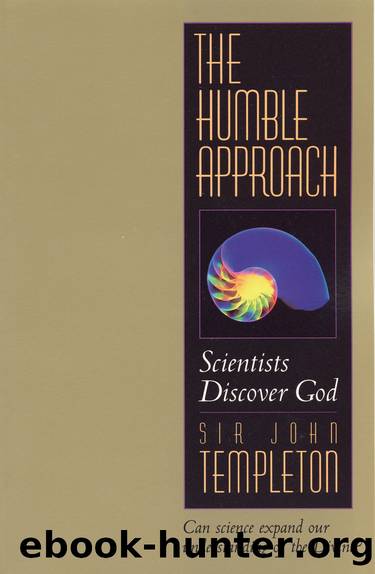The Humble Approach Rev Ed by John Marks Templeton

Author:John Marks Templeton
Language: eng
Format: epub
Publisher: Templeton Press
X Earth as a School
What is the purpose of life on earth? Many philosophers have said that God created the earth as a school for souls. Some say human souls are created out of the thoughts of God. God may have invented and created each body and mind as the temporary shell to house a soul during its childhood.
Rev. Earnest O. Martin said in 1962:
. . . spiritual development, the formation of a heavenly character. This is the purpose of life on this planet, which Swedenborg spoke of as a seminary for heaven. It is here that we grow into angelhood and begin to develop the potentialities that God sees within us. Heaven is essentially a quality of life, an inward condition or state in which men live in harmony with the will of God. And yet it is also a placeâa real, tangible, substantial existence. Swedenborgâs answer is that life is one. The natural world and the spiritual world are not two distinct, separate existences that have no relationship. We are spirits and from the day of our conception we are citizens of the spiritual world. Love, understanding, loyalty, friendship, patience, mercy,âthese are spiritual realities the Lord seeks to instill in our lives here and now. The natural world is the theater in which our spirits operate and develop and grow. It is here that our loves, our attitudes and our desires are molded and find expression. That is why God has placed us here.
An omnipotent God could have created us all as angels instantly. But, He did not choose that method. A lifetime on earth may seem a slow way to create a soul. And eighteen billion years may seem a slow way to create the school building; but, let us remember that God also created time. Nels F. S. Ferre (1908â1972) used to remind us that God is not bound by time, for He created not only our universe but also both space and time. Time may have been created as the means and medium for learning, for growth, and for building the ability to give love. William Adams Brown (1865â1906) taught that the purpose of God in creating the world is to develop the Kingdom of God, or more specifically:
. . . the production beings like the good God, and their union with Himself in the fellowship of life. . . . it is because the world as we know it today ministers to such a spiritual end that we believe it had its origin in the will of the holy and loving Father whom Christ reveals.27
The great question is this: How much progress can our soul make before our body becomes uninhabitable? To progress is to increase our love of God, our understanding of God, and our love for His children. Our body has a physical reality, but it is only a temporary shell. Death destroys only that which is fit for destruction. The butterfly developing in the chrysalis in due time splits and abandons
Download
This site does not store any files on its server. We only index and link to content provided by other sites. Please contact the content providers to delete copyright contents if any and email us, we'll remove relevant links or contents immediately.
Getting It, Then Getting Along by L. Reynolds Andiric(655)
Religion and Politics Beyond the Culture Wars : New Directions in a Divided America by Darren Dochuk(575)
Global Justice, Christology and Christian Ethics by Lisa Sowle Cahill(429)
Positive Psychology in Christian Perspective: Foundations, Concepts, and Applications by Charles Hackney(355)
Forgiveness and Christian Ethics by Unknown(349)
Douglas Hamp The First Six Days by Unknown(297)
The Horrors and Absurdities of Religion by Arthur Schopenhauer(271)
Insurgency, Counter-insurgency and Policing in Centre-West Mexico, 1926-1929 by Mark Lawrence(266)
Middle Eastern Minorities: The Impact of the Arab Spring by Ibrahim Zabad(250)
Christian Martyrdom and Christian Violence by Matthew D. Lundberg;(242)
Beyond Heaven and Earth by Gabriel Levy(237)
The Oxford Handbook of Greek and Roman Mythography by R. Scott Smith;Stephen M. Trzaskoma;(235)
God and Eros by Patterson Colin;Sweeney Conor;(230)
The Bloomsbury Reader in Christian-Muslim Relations, 600-1500 by David Thomas;(225)
Autobiography, Volume 2: 1937-1960, Exile's Odyssey by Mircea Eliade(216)
Cult Trip by Anke Richter(212)
Witches: the history of a persecution by Nigel Cawthorne(211)
An Introduction to Kierkegaard by Peter Vardy(202)
The Global Repositioning of Japanese Religions by Ugo Dessi(196)
